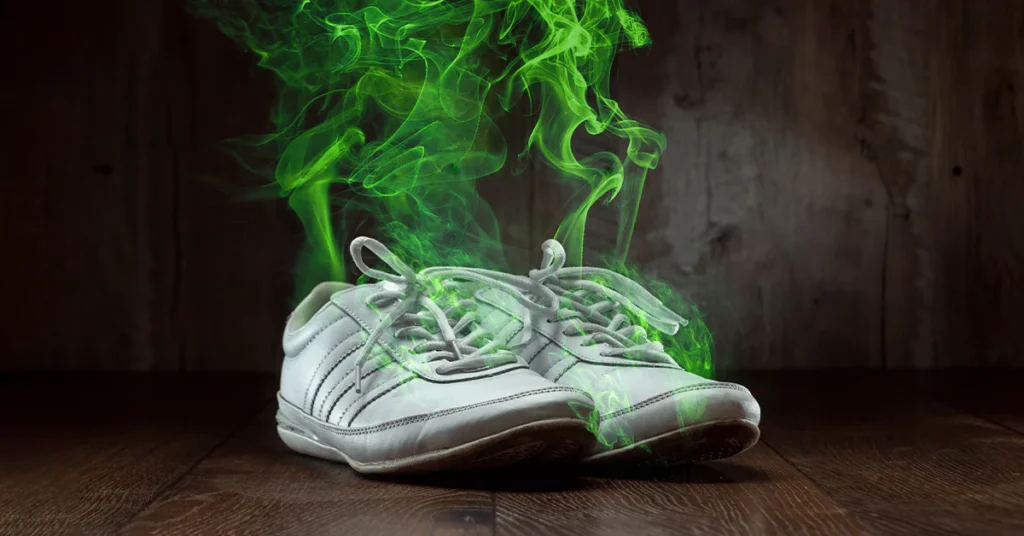Before we discuss proven five-step method to remove smell from running shoes and keep them smelling fresh, it’s important to understand that running shoes are particularly susceptible to odor because of the conditions they endure: heat, moisture, and enclosed spaces—all ideal for bacteria growth. Here’s how each factor contributes to that distinctive “shoe smell.”
Table of Contents
Toggle1. Sweat and Moisture:
When you run, your feet produce sweat to regulate body temperature. This sweat permeates the fabric, especially in shoes with breathable materials designed to wick moisture. When sweat accumulates, it creates a damp environment, perfect for bacteria to grow.
2. Bacteria and Fungi:
The moisture in your shoes allows bacteria to thrive, particularly Brevibacterium linens, which is a common culprit behind the sour, cheesy odor. Bacteria and fungi break down sweat and dead skin cells, releasing byproducts that carry an unpleasant smell.
3. Materials in Shoes:
Certain shoe materials, like synthetic fabrics, tend to retain odors longer than natural materials, making it difficult to eliminate the smell fully. Additionally, insoles, which often absorb the most sweat, contribute to trapping odor molecules within the shoe.
How to Fix Smelly Running Shoes: 5 Effective Steps
Now that we know what causes the odor, let’s tackle ways to address and prevent it with five evidence-based solutions.
Step 1: Clean and Dry Insoles Regularly
The insole absorbs most of the sweat and odor. Remove and wash insoles periodically to prevent odor buildup.
How to Clean Insoles:
Remove the insole, soak it in a mixture of warm water and mild detergent, and scrub with a soft brush. Rinse thoroughly and allow it to air dry completely before reinserting. For a deeper clean, you can use a vinegar solution (one part vinegar to three parts water) to eliminate bacteria.
Why This Works:
Washing the insoles regularly removes bacteria and fungi that thrive in sweat and dead skin particles. Drying the insoles completely is crucial because moisture promotes bacterial growth.
Step 2: Use Baking Soda as a Natural Deodorizer
Baking soda is one of the most popular solutions for shoe odor due to its neutralizing properties.
How to Apply:
Sprinkle a few tablespoons of baking soda directly into each shoe, or create a sachet with baking soda inside a coffee filter or breathable cloth. Let it sit overnight and discard the baking soda the next day.
Why This Works:
Baking soda’s alkaline nature helps neutralize acidic odor molecules, absorbing excess moisture and thus inhibiting bacterial growth
Step 3: Try Essential Oils to Combat Bacteria and Add Fragrance
Essential oils like tea tree, lavender, and eucalyptus have antimicrobial properties that help control bacteria and fungi in shoes.
How to Use Essential Oils:
Add a few drops of essential oil directly onto a cotton ball and place it in each shoe overnight. Alternatively, you can add essential oils to baking soda or cornstarch for an added antibacterial and deodorizing effect.
Why This Works:
Essential oils, particularly tea tree oil, contain compounds that can kill bacteria and fungi, adding a pleasant scent to your shoes without just masking the odor
Step 4: Expose Shoes to Sunlight and Fresh Air
Sunlight is a natural disinfectant and works wonders in reducing moisture and bacteria.
How to Apply:
After running, loosen the laces, pull the tongue out, and place the shoes in direct sunlight for a few hours. This works best on dry, sunny days. Avoid prolonged exposure, especially for delicate materials like leather or suede, as this can degrade them over time.
Why This Works:
UV rays from the sun kill odor-causing bacteria and fungi while allowing moisture to evaporate, thus making it more challenging for new bacteria to settle in
Step 5: Freeze Your Shoes Overnight
Freezing is an effective yet unusual method to combat shoe odor. Low temperatures inhibit bacterial activity and help freshen up shoes.
How to Apply:
Place each shoe in a sealed plastic bag to prevent contamination, then place them in the freezer overnight. Remove them the next morning, let them warm up slightly, and air them out before wearing.
Why This Works:
Bacteria thrive in warm, moist environments, and freezing disrupts their growth cycle. The low temperature stops bacterial reproduction and can significantly reduce odors
Bonus Tips to Prevent Future Odors
Rotate Shoes: Giving shoes time to fully dry between wears helps control moisture buildup.
Wear Moisture-Wicking Socks: These socks pull sweat away from the skin, minimizing moisture in your shoes.
Use Shoe Deodorizers: Commercial deodorizers or natural sachets with dried herbs like cedar or rosemary can help maintain freshness.
Regularly Wash Shoes: Machine wash on a gentle cycle if the material allows, then air dry to prevent odor buildup over time.
Running shoes, due to their design and purpose, are more susceptible to odor than other shoes. Addressing the root causes—bacteria, moisture, and inadequate drying—is key to maintaining fresh-smelling shoes. By following these steps and taking preventive measures, you can effectively keep odors at bay and extend the life of your running shoes.


Pingback: How to Choose the Best Running Shoes - Athletico
Pingback: 6 Places You Should Never Carry a Phone When Running - Athletico